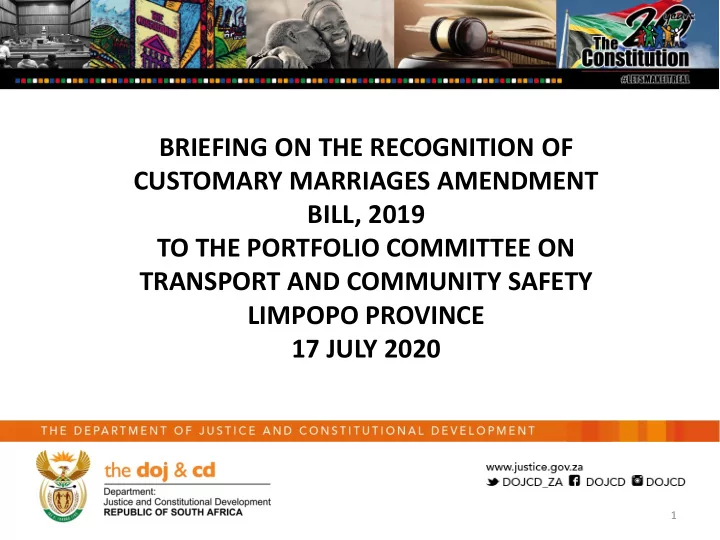

BRIEFING ON THE RECOGNITION OF CUSTOMARY MARRIAGES AMENDMENT BILL, 2019 TO THE PORTFOLIO COMMITTEE ON TRANSPORT AND COMMUNITY SAFETY LIMPOPO PROVINCE 17 JULY 2020 1
Background: The Recognition of Customary Marriages Amendment Bill, 2019 (the Bill), aims to amend the Recognition of Customary Marriages Act, 1998,(the RCMA) by further regulating the proprietary consequences of customary marriages entered into before the commencement of the RCMA in order to bring the provisions of the Act in line with the judgments of the Constitutional Court which the Court found to be constitutionally invalid because they discriminate unfairly against certain women in customary marriages. 2
BACKGROUND The Constitutional Court, in Ramuhovhi and Others v President of the Republic of South Africa and Others [2017] confirmed the decision of the High Court of South Africa, Limpopo Local Division and held that section 7(1) of the RCMA inconsistent with the Constitution because it discriminates unfairly against women in polygamous customary marriages which were entered into before the commencement of the Act on the basis of gender, race and ethnic or social origin. 3
Background: Contd Currently, section 7(1) of the RCMA provides that the proprietary consequences of a customary marriage entered into before the commencement of the Act continues to be governed by customary law. This, in effect means that such wives have no right of ownership and control of marital property and that the right of ownership and control of marital property is the sole preserve of the husband. This was found to be the case particularly in Venda customary law. 4
Background: (Contd) The Court found this provision to be discriminatory on the basis of gender and held that a husband and his wives in polygamous customary marriages entered into before the RCMA must share the family property, as well as share equally the right of management and control of such family property. This protection is also extended to the right of management and control of house property between a husband and each of his wives in the house property of each polygamous customary marriage. 5
The Bill: Clause 1 Clause 1 of the Bill amends the definition of "traditional leader” in order to align it with the definition as contained in the Traditional Leadership and Governance Framework Act, 2003(Act 41 0f 2003). 6
Clause 2: Clause 2 of the Bill amends section 7(1) of the RCMA in order to provide that the proprietary consequences of a polygamous customary marriage, entered into before the commencement of the RCMA are that the spouses in such a marriage have joint and equal ownership and other rights and rights of management and control, over marital property. The Bill provides that the rights in the property must be exercised in respect of all house property, by the husband and wife of the house concerned, jointly and in the best interests of the family unit constituted by the house concerned. The rights in respect of all family property, must be exercised by the husband and all the wives, jointly and in the best interests of the whole family constituted by the various houses. 7
Clause 2:(contd) Each spouse retains exclusive rights over his or her personal property. The Bill provides that the terms “marital property”, “house property”, “family property” and “personal property” have the meaning ascribed to them in customary law. The effect of this amendment is that the proprietary consequences of a polygamous customary marriage will no longer be governed by customary law. 8
Clause 2: (Contd) This clause further amends section 7(2) of the RCMA in line with the judgment in Gumede v President of the Republic of South Africa 2009(3) SA 152 (CC) in which section 7(2) was declared constitutionally invalid because the section made only customary marriages entered into after the commencement of the RCMA where a spouse is not a partner to any other existing customary marriage to be a marriage in community of property. 9
Clause 2: (Contd) The effect of this amendment is that all customary marriages whether entered into after or before the commencement of the RCMA will be marriages in community of property and of profit and loss unless the spouses decide to exclude that by means of an antenuptial contract. 10
Clause 3: Clause 3 contains transitional provisions. The Bill will not invalidate the winding up of a deceased estate that was finalised, or the transfer of marital property that had already been effected before the commencement of the RCM Act. Also, the Bill will not apply to the transfer of marital property where, at the time of such transfer, the person to whom the marital property was to be transferred was aware that the marital property in question was subject to a legal challenge . 11
Conclusion: The Constitutional Court in the Ramuhovhi judgment ordered that the remedial amendments must be put in operation by 30 November 2019. An application was made to court for an extension of the deadline , but this was rejected by the Constitutional Court. The interim order of the court has since become final. 12
Recommend
More recommend